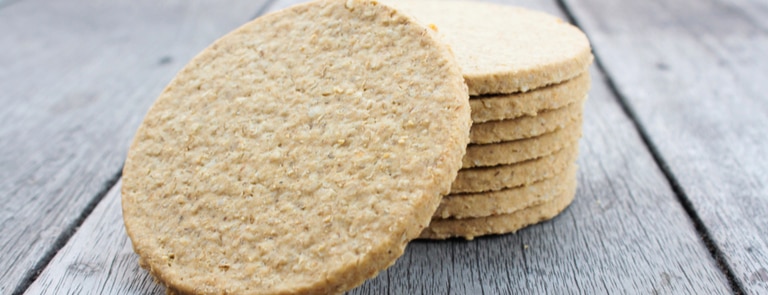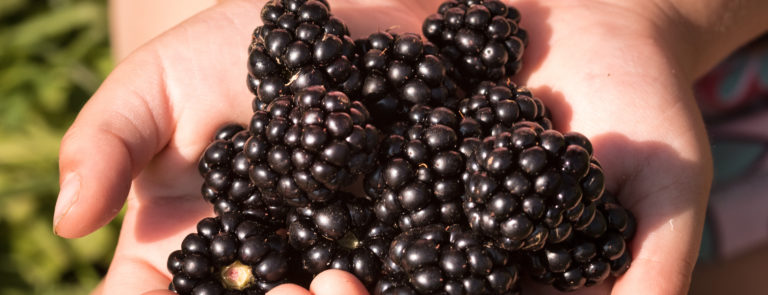20% off €35
Are oatcakes healthy?

Oatcakes have been around for thousands of years, yet when you Google ‘oatcake’ you’re met with descriptions likened to flatbreads, crackers, biscuits or even pancakes. So, what even are they?
In this article not only will we explain what an oatcake is, but we’ll go into detail about their nutritional information and how adding them to your diet benefit you and your diet.
What are oatcakes?
OK, so oatcakes are in fact some kind of biscuity, flatbready, pancakey type snack alternative. It's not that they’re difficult to explain, it’s more the category they fall into.
However, unlike their snacky counterparts – oatcakes are usually served as with savoury foods, such as cheese or scrambled egg and smoked salmon.
Originally, they’re made using oatmeal, flour, water and yeast. Although more recently it could be argued that gluten-free alternatives, which don’t contain flour may be equally as popular.
Homemade oatcakes are cooked using a griddle or in the oven, but you can also buy them ready-made. As a rule, vegan oatcakes are just oatcakes, but you can buy gluten free oatcakes too, if that’s your preference.
Where do oatcakes come from?
Traditionally oatcakes are a customary Scottish food enjoyed at breakfast time.
Once described as a “mainstay of Scottish breads for centuries”, oatcakes have been around since at least the Roman conquest of Britain in 43AD.
Since that time, they have become a popular British food that is enjoyed by none other than Queen Elizabeth herself.1
Are oatcakes good for you?
There’s a bit of a caveat with oatcakes - as they are a great source of fibre, on their own! But it totally depends on what you choose to put on them that might add more fat and salt, which will obviously lower their nutritional value.
How many calories in an oat cake?
The number of calories in oatcakes will vary, depending on size. It’s suggested that an eight-inch oatcake contains 120 calories.2
The oatcake is seen as a low-energy dense food, which means it has lower calorie content when compared to its serving size. This means that oatcakes may help you feel fuller on less calories, which when eaten as part of a controlled diet may help you control your weight.3
How many carbs?
As oatcakes are flour based, most of the calories they contain come from carbohydrates.
Having said that, they’re also a great source of fibre. One eight-inch oatcake contains 34g of carbohydrates and three-grams of fibre – meaning that one oat cake meets 12 percent of your daily fibre intake.4
According to the NHS, adults should have 30g of fibre a day as part of a healthy diet. However, most adults get around 18g per day.5
Do oatcakes contain protein?
As the name might suggest, oatcakes are made from oats which contain 10.9g protein per 100g, which for a grain is surprisingly high.
However, oats on their own aren’t classed as a complete protein.
Our bodies need nine essential amino acids to build protein. These are known as ‘essential’ because our body is unable to produce them, so we need foods that contain them in order to build protein. To be classed as a ‘complete’ protein, a food must contain adequate amounts of all nine.
Oats do contain all nine essential amino acids which are necessary for it to make up a complete protein, however oats don’t contain quite enough lysine (one of the nine essential amino acids) to qualify as a complete protein.
So, if you wanted to, you could bump up the amount of lysine with foods such as cashew nuts or pumpkin seeds to ensure you get enough.
What is the fat content of oatcakes?
One oatcake is said to contain four grams of total fat, one of which is saturated fat. According to the NHS, the daily saturated fat intake for men should not exceed 30g of and for women it is 20g per day. Which again makes oatcakes healthy options for people who are watching their weight.6
Are oatcakes better for you than bread?
Taking the above information into consideration – comparing oatcakes to bread is a fairly easy contest. Given their low GI carbs and ability to slowly digest, oatcakes may be small, but they can keep you fuller for longer.7
What do you eat with oatcakes?
Dating back to their Scottish origin, oatcakes were traditionally eaten with every meal as an alternative to bread.
Today they are used in a number of ways. To give you a bit of understanding, they’re known as oat cakes, oatcake biscuits and even oatmeal cakes, so it's fair to say that they’re completely versatile
15 ways to eat oatcakes
To give you a bit of inspiration, we’ve come with 15 ways you can enjoy oatcakes.
Keep in mind when making your selection, that’s it the oatcake that’s healthy – it’s the topping that will add more calories!
Try topping your oatcakes with these:
- Sliced, reduced fat, mature hard cheese (e.g. cheddar), chopped dried fig, garnished with watercress and a dash of balsamic vinegar.
- Canned tuna, crème fresh and spring onion
- Cottage cheese, chopped hazelnuts and shredded chicory leaves.
- Sliced bananas, chopped walnuts and a drizzle of honey.
- Hummus, chopped cherry tomato, carrot or cucumber
- Sliced cucumber, tinned salmon and a squeeze of lemon.
- Low fat crème fraiche, sliced strawberries, blackberries and fresh mint.
- Sliced avocado and chilli flakes
- Goat’s cheese and pesto
- Boiled egg
- Cheese and grape
- Strawberry and honey
- Smoked salmon and cream cheese
- Peanut butter and banana
- Butter and a jam
Summary
- Oatcakes have been around for thousands of years - they were once known as the bread of Scotland!
- Today they’re known throughout Britain as a healthy alternative to bread due to their slow release digestion and low calories
- Considering they’re only small, the oatcake can keep you fuller for longer than bread, not only that they can be used for pretty much any meal you choose!
- The biggest tip we can give is to keep in mind what you eat them with
Last updated: 03 May 2021
- http://news.bbc.co.uk/1/hi/uk/965079.stm
- https://www.livestrong.com/article/534084-nutritional-facts-for-oatcakes/
- https://www.livestrong.com/article/534084-nutritional-facts-for-oatcakes/
- https://www.livestrong.com/article/534084-nutritional-facts-for-oatcakes/
- https://www.nhs.uk/live-well/eat-well/how-to-get-more-fibre-into-your-diet/
- https://www.nhs.uk/live-well/eat-well/different-fats-nutrition/
- https://www.menshealth.com/uk/weight-loss/a746412/slim-down-munchies-337375/



